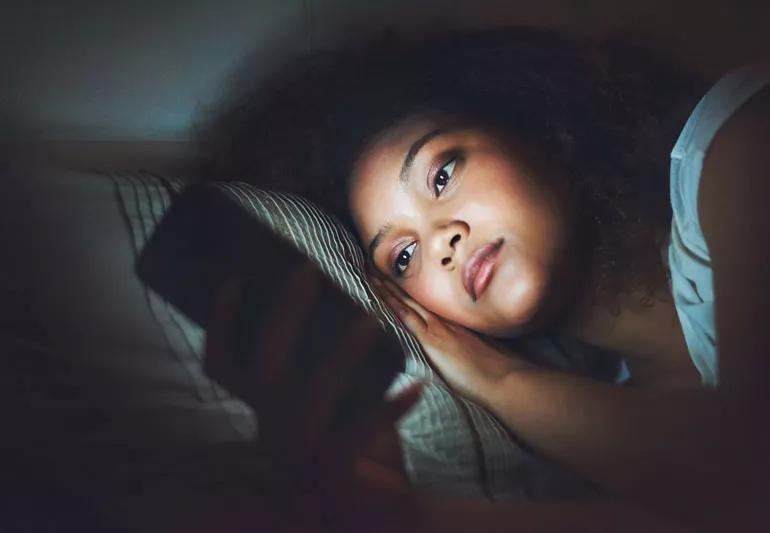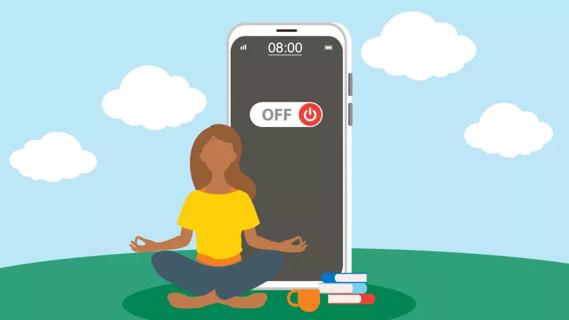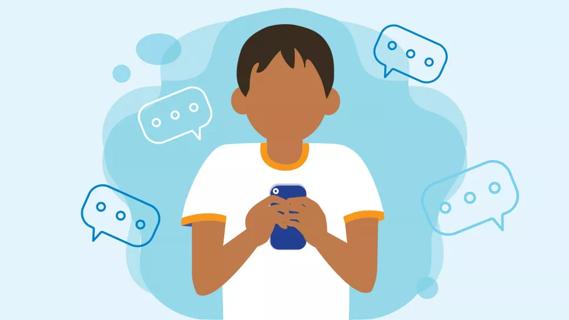3 reasons to put your phone use on pause before sleep

If your smartphone rests right next to you (or even under your pillow) every night when you go to sleep, you’re not alone. Our phones are constant companions, even during the wee hours of the night. You’re able to answer calls, texts and emails at a moment’s notice. And isn’t that the best part about technology? Always being connected and never truly shutting down or logging off?
Advertisement
Cleveland Clinic is a non-profit academic medical center. Advertising on our site helps support our mission. We do not endorse non-Cleveland Clinic products or services. Policy
Not so fast. You probably don’t even realize how your smartphone habits are affecting your sleep and your brain’s health. Sleep medicine expert Michelle Drerup, PsyD, DBSM, sheds some light on this sleep-sabotaging habit — and why you shouldn’t use your phone before bed.
Yes, using your phone too much close to bedtime can affect your sleep.
What may seem like a harmless habit to you — jumping into bed and opening up your phone — can actually have a big impact on your overall health.
Doomscrolling, for example, can distract you, which keeps you awake, stimulates your brain and delays REM sleep. In fact, when your brain revs up, it can keep you awake for hours beyond your normal bedtime.
However, it’s not just that you’re on your phone that can disrupt your sleep. It’s more what you’re doing with the technology that makes a difference, like actively using your phone.
“Studies indicate that more passive use of technology — such as listening to music via your phone or watching a non-distressing TV show — doesn’t really have an effect on sleep compared to active use,” says Dr. Drerup. “Active use includes things like texting or social media.”
Smartphones are designed to make our lives easier and more productive, as well as entertain us and provide information. But the smartphone era has forced us to feel like we can never really log off, even when we’re sleeping. That can have a negative effect on your health, and here’s why.
Advertisement
When it’s time to turn off the lights and go to sleep, the last thing our brain needs is more information and stimulation.
“Checking your phone stimulates your brain,” Dr. Drerup explains. “You’re more active and awake. Even just a quick check can engage your brain and delay sleep.”
Your mind can stay active and engaged long after you’ve scrolled through social media or responded to a few work emails.
And it’s not just the alertness you get from late-night social media sessions either. It’s thinking about or feeling your phone going off under your pillow. It’s listening for that email chime letting you know a project is moving along.
Phone screens and sleep have a tricky relationship. The blue light from your phone is an artificial color that mimics daylight. This can be great during the day, as it can make you feel more alert, but it’s just the opposite of what you need at night when you’re winding down and ready to hit the hay.
Studies have shown that the blue light emitted by your smartphone is bad for your vision. But it can be bad for your sleep, too.
Exposure to blue light can affect your internal body clock and throw off your circadian rhythm. This rhythm is in tune with light and dark. It’s why you feel more tired at night when the sun starts to set and why you feel more energized in the morning when it’s light.
Research has found a correlation between suppressed levels of melatonin and exposure to blue light. Melatonin is a hormone responsible for controlling your sleep-wake cycle. When your body runs low on it, you can experience insomnia, tiredness during the day and irritability.
This isn’t necessarily happening to everyone, though. “Studies that have really shown support for light’s impact on sleep onset and melatonin production are much more people using screens for two hours straight prior to bedtime,” Dr. Drerup notes.
“That’s in contrast to someone checking to make sure they don’t have any messages to respond to an hour before bed. Or someone looking over their schedule for the next day and then doing something to relax.”
Dr. Drerup adds that what you’re doing on your phone before bed matters more. “The content you’re looking at probably has more of an impact than the blue light from the screens,” says Dr. Drerup. “There might be people that are more sensitive to it — but it’s really much more about what you’re doing on those devices.”
Going to bed and falling asleep should be a peaceful, happy and relaxing experience. Engaging with your phone too close to bedtime can negatively impact those feelings.
You probably know what it’s like to scroll through Facebook right before bed and see something that makes you upset. Unsurprisingly, stress and anxiety are often two major reasons for disrupted sleep.
Advertisement
Even seeing something right before bed that makes you happy can trigger a response that prolongs falling sleep, which consequently delays REM sleep. These emotions can leave you staring at the ceiling for hours, feeling wide awake.
There’s no hard and fast rule as to when you should put down your phone before bed. “This advice is all over the place in terms of what we recommend,” says Dr. Drerup. “Some people say, ‘Oh, you shouldn’t use it an hour before bedtime or two hours before.’ But most of the research on this issue has really been done in children. We have strong evidence in that group that media use and technology before bed can lead to poor sleep.”
Generally, however, tucking your devices away for the night an hour or two before bed is a good rule. That includes not just phones but also other devices and electronics. While smartphones are typically the main culprit, even tablets and TVs can contribute to poor sleep.
It’s important to establish a relaxing bedtime routine and discourage activities that can lead to anxiety or a high emotional response. Choose nighttime activities that promote sleep, such as practicing meditation or relaxation techniques.
If you’re really struggling with limiting screen time before bed, you might need to put your phone in a different room or invest in a clock radio for your bedside table. There are also options within your phone (like setting it on “do not disturb” or “night mode”) to minimize distractions and notifications that can help get you in the mood to snooze.
Advertisement
Using your phone at night is a habit. What can make this habit even worse is feeling the need to constantly be connected and available. Once you’ve started to undo the idea that you have to immediately answer, respond, post or scroll, your sleep will improve.
Advertisement
Learn more about our editorial process.
Advertisement

It isn’t a recognized mental health disorder, but research shows that problematic social media use can negatively affect your mental health, self-esteem and sleep

Too much blue light, especially from digital sources, may lead to eye strain and computer vision syndrome

When done in excess, watching TV can disrupt your sleep and lead to physical inactivity and social isolation

Imagination, completing tasks and social interactions are all key benefits for your brain

They’re fun to watch, but medical TV shows are often more hype than reality — and you shouldn’t rely on them for factual medical information

Embrace mindfulness and practice checking your phone consciously, not compulsively

Identify your triggers, set ground rules for your break and start practicing mindfulness

Too much screen time and unrealistic expectations and perceptions and can lead to an increased risk of anxiety and depression

Wearing a scarf, adjusting your outdoor activities and following your asthma treatment plan can help limit breathing problems

Your diet in the weeks, days and hours ahead of your race can power you to the finish line

When someone guilt trips you, they’re using emotionally manipulative behavior to try to get you to act a certain way